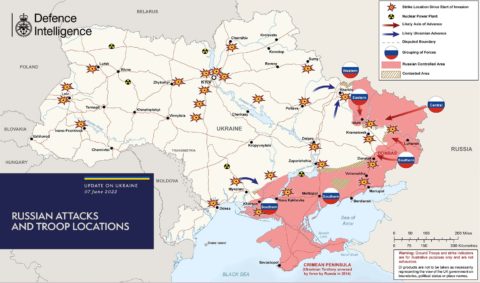JoNova links to this Foreign Policy article by Ted Nordhous, signfiying the end of a “lame Cold War substitute” as the conflict in Ukraine pushes it decisively off the agenda for most western nations:
Four days after Russian tanks rolled into Ukraine, the U.N. Intergovernmental Panel on Climate Change released its latest assessment of the impacts of global warming. Leading media outlets did their best to pick out the most dire scenarios and findings from the report. But the outbreak of the first major European war since 1945 kept the report off the front page or, at the very least, below the fold. “Climate Change Is Harming the Planet Faster Than We Can Adapt” simply couldn’t compete with “Putin Is Brandishing the Nuclear Option”.
Meanwhile, the headlong rush across Western Europe to replace Russian oil, gas, and coal with alternative sources of these fuels has made a mockery of the net-zero emissions pledges made by the major European economies just three months before the invasion at the U.N. climate summit in Glasgow, Scotland. Instead, questions of energy security have returned with a vengeance as countries already struggling with energy shortages and price spikes now face a fossil fuel superpower gone rogue in Eastern Europe.
In the decades following the end of the Cold War, global stability and easy access to energy led many of us to forget the degree to which abundant energy is existential for modern societies. Growing concern about climate change and the push for renewable fuels also led many to underestimate just how dependent societies still are on fossil fuels. But access to oil, gas, and coal still determines the fate of nations. Two decades of worrying about carbon-fueled catastrophes — and trillions of dollars spent globally on transitioning to renewable power — haven’t changed that basic existential fact.
Virtually overnight, the war in Ukraine has brought the post-Cold War era to a close, not just by ending Europe’s long era of peace, but by bringing basic questions of energy access back to the fore. A new era, marked by geopolitically driven energy insecurity and resource competition, is moving climate concerns down on the list of priorities. If there is a silver lining in any of this, it’s that a shift of focus back to energy security imperatives might not be the worst thing for the climate. Given the scant effect international climate efforts have had on emissions over the past three decades, a turn back toward energy realpolitik — and away from the utopian schemes that have come to define climate advocacy and policymaking worldwide — could actually accelerate the shift to a lower-carbon global economy in the coming decades.
The issue of climate change burst into the global debate just as the Cold War was coming to an end. As one existential threat seemingly receded, another came into view. For much of the international community, particularly the United Nations and its agencies, climate change also became much more than an environmental issue, offering an opportunity to reshape the post-Cold War order to be more equitable, multilateral, and politically integrated.
Nonetheless, when the framework for climate action emerged in the early 1990s, it built on the experience of the Cold War era. U.S.-Soviet arms control agreements became the model for global cooperation on climate change. Just as the superpowers had signed treaties to gradually draw down their nuclear weapons stocks, nations would commit to draw down their emissions. Yet the first major agreement to propose legally binding limits on emissions — the 1997 Kyoto Protocol — was dead from the moment the U.S. Senate unanimously rejected its terms, even before the negotiations had been finalized. Combine U.S. opposition with the understandable reluctance of energy-hungry, fast-developing nations such as China and India to even consider limiting emissions, and the inefficacy of international climate action was set.




